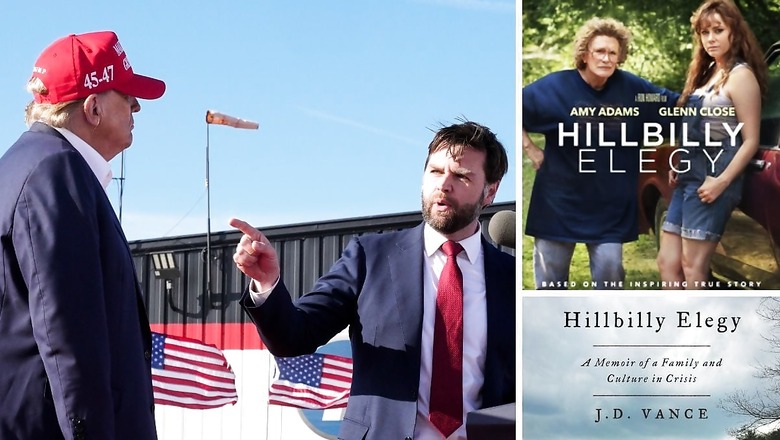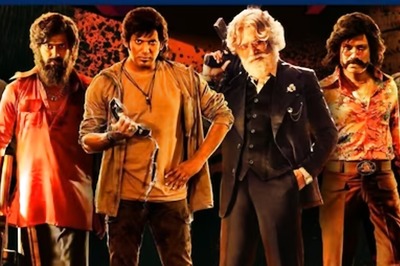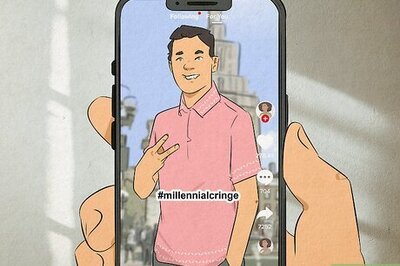
views
JD Vance’s swift journey from a venture capitalist to now a vice-presidential candidate for Donald Trump has one key chapter – his bestselling memoir ‘Hillbilly Elegy’, which was also made into a film starring Amy Adams and Glenn Close.
Vance, 39, would be the youngest vice-president since Richard Nixon, who served two terms under Dwight Eisenhower, if Trump comes to power.
THE MEMOIR
Vance’s bestseller about his roots in rural Kentucky and blue-collar Ohio made him a national celebrity soon after its publication in the summer of 2016, and became a cultural talking point after Donald Trump’s stunning victory that November.
In ‘Hillbilly Elegy’, Vance reflected on the transformation of Appalachia from reliably Democratic to reliably Republican, sharing stories about his chaotic family life and about communities that had declined and seemed to lose hope. Vance first thought of the book while studying at Yale Law School, and completed it in his early 30s, when it was eventually published by HarperCollins.
“I was very bugged by this question of why there weren’t more kids like me at places like Yale … why isn’t there more upward mobility in the United States?” Vance told The Associated Press in 2016.
“I felt that if I wrote a very forthright, and sometimes painful, book, that it would open people’s eyes to the very real matrix of these problem,” Vance told the AP in 2016. “If I wrote a more abstract or esoteric essay … then not as many people would pay attention to it because they would assume I was just another academic spouting off, and not someone who’s looked at these problems in a very personal way.”
Who is JD Vance? Donald Trump's pick for Republican Vice President candidate for the USA Elections 2024CNN's @RafaelRomoCNN brings some insights#JDVance #DonaldTrump #USAElections | @kritsween pic.twitter.com/DAPtYNFi28
— News18 (@CNNnews18) July 16, 2024
SOLD 1.6 MILLION COPIES, GOT MIXED REVIEWS
Sales for ‘Hillbilly Elegy’ total at least 1.6 million copies, according to Circana, which tracks around 85% of hardcover and paperback sales.
Vance’s book, subtitled ‘A Memoir of a Family and Culture in Crisis’, was initially praised by conservatives for its criticisms of welfare and what Vance saw as “too many young men immune to hard work.” Reviewing “Hillbilly Elegy” in The American Conservative, Rod Dreher praised Vance’s contention that public policy does little to “affect the cultural habits that keep people poor.”
At the same time, ‘Hillbilly Elegy’ was criticised, including by some from the Appalachian communities Vance was portraying. Common critiques were that it flattened rural life and sidestepped the role of racism in politics. Sarah Jones, writing in The New Republic that she grew up in poverty on the border of southwestern Virginia and eastern Tennessee, called the book a list of “myths about welfare queens repackaged as a primer on the white working class.” In The Guardian, Sarah Smarsh wrote that Vance offered a narrow perspective on American poverty. “Most downtrodden whites are not conservative male Protestants from Appalachia,” Smarsh wrote.
Within hours of Trump’s announcement on Monday, it was No. 1 on Amazon.com, surging from No. 220 earlier in the day.
THE MOVIE ADAPTATION
Ron Howard adapted the book into a 2020 movie of the same name. The movie was released in select cinemas on November 11, 2020, and streamed on Netflix on November 24, 2020.
It was the most-watched film on the site in its first day of release, before finishing third in its debut weekend. Over its second weekend, the film fell to eighth place.
While the performances were appreciated, the direction and screenplay was panned.
On Rotten Tomatoes, 25% of 251 critics gave the film a positive review, with an average rating of 4.6/10. According to Metacritic, which calculated a weighted average score of 38 out of 100 based on 43 critics, the film received “generally unfavorable reviews”
The Independent reported that the film was widely criticized for “perpetuating stereotypes about the poor”. Katie Rife of The A.V. Club called it “bootstrapping poverty porn” and said that it “reinforces the stereotypes it’s meant to be illuminating.”
Close got Supporting Actress nominations at the Academy Awards, the Golden Globe Awards, and Screen Actors Guild Awards. Adams’s performance was also recognized by the Screen Actors Guild, with a nomination for Outstanding Lead Actress. The film also got criticized for its screenplay and direction.
Glenn Close became the third performer in history to be nominated for an Academy Award and a Golden Raspberry Award (a parody award show for worst cinematic failures) for the same performance.
Who is Senator J.D. Vance, Donald Trump's pick for Vice President? Know all about him and his India connection. #DonaldTrump #JDVance #UnitedStates #USNews #USElections pic.twitter.com/FaiLcWDg23— News18 (@CNNnews18) July 16, 2024
AUTHOR VANCE A TRUMP CRITIC, SENATOR VANCE A RUNNING MATE
After Trump’s election, Vance’s book became an unofficial guide for liberals baffled both by Trump’s rise and by the bonds shared between some of the country’s poorest residents and the wealthy New York real estate man-turned-TV star.
The Washington Post dubbed Vance, initially a fervent critic of Trump, “The Voice of the Rust Belt.” The book had catapulted him to fame as a “Trump whisperer,” capable of explaining Trump’s appeal to the White working class. “I’m definitely not gonna vote for Trump because I think that he’s projecting very complex problems onto simple villains,” Vance told CNN’s Jake Tapper ahead of the 2016 election. “Trump makes people I care about afraid. Immigrants, Muslims, etc. Because of this I find him reprehensible. God wants better of us,” he wrote in October 2016.
In private messages, he wondered ahead of Trump’s election whether he was “America’s Hitler” and in 2017 said the then-president was a “moral disaster.” In public, he agreed Trump was a “total fraud” who didn’t care about regular people and called him “reprehensible.” “Fellow Christians, everyone is watching us when we apologize for this man. Lord help us,” he tweeted after the “Access Hollywood” tape was published in 2016. Vance also liked tweets that said Trump committed “serial sexual assault,” called him “one of USA’s most hated, villainous, douchey celebs,” and harshly criticised Trump’s response to the deadly 2017 White nationalist rally in Charlottesville, Virginia
Just overwhelmed with gratitude. What an honor it is to run alongside President Donald J. Trump. He delivered peace and prosperity once, and with your help, he'll do it again.
Onward to victory!
— J.D. Vance (@JDVance1) July 16, 2024
But by 2020, Vance fully embraced Trump, telling podcaster Megyn Kelly after the election he voted for him. A year later, Vance announced he was running for Senate in Ohio and vied for Trump’s endorsement, which he ultimately received. But at the beginning of that campaign, Vance was forced to apologize after CNN resurfaced old tweets from the 2016 campaign and early in 2017 in Trump’s administration that he had deleted. “I did say those critical things and I regret them, and I regret being wrong about the guy,” Vance told Fox News in 2021.
In a statement to CNN last month, Vance cited Trump’s “many successes in office” for changing his mind on the former president. “I’m proud to be one of his strongest supporters in the Senate today and I’m going to do everything in my power to ensure President Trump wins in November – the survival of America depends on it.”
With Agency Inputs

















Comments
0 comment